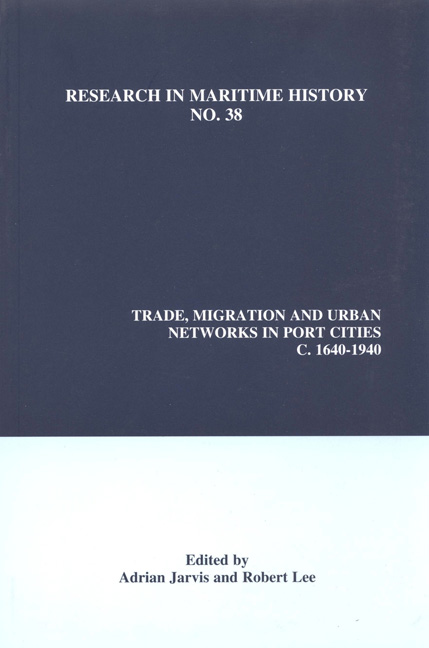Book contents
- Frontmatter
- Table of Contents
- Contributors' Notes
- “Trade, Migration and Urban Networks, c. 1640-1940: An Introduction”
- “Portuguese Jews in Amsterdam: An Insight on Entrepreneurial Behaviour in the Dutch Republic”
- “Contrasting Merchant Communities in the Early Eighteenth Century: Stockholm, Calabar and Charleston”
- “Integration of Immigrant Merchants in Trondheim in the Seventeenth and Eighteenth Centuries
- “In the Eye of the Storm: The Influence of Maritime and Trade Networks on the Development of Ostend and Vice Versa during the Eighteenth Century”
- “Exploiting International Webs of Relations: Immigrants and the Reopening of the Harbour of Antwerp on the Eve of the Nineteenth Century”
- “Migrants, Merchants and Philanthropists: Hierarchies in Nineteenth-Century Greek Ports”
- “Port Cities, Diaspora Communities and Emerging Nationalism in the Ottoman Empire: Balkan Merchants in Odessa and Their Network in the Early Nineteenth Century”
- “Combining Business and Pleasure? Cotton Brokers in the Liverpool Business Community in the Late Nineteenth Century”
“Exploiting International Webs of Relations: Immigrants and the Reopening of the Harbour of Antwerp on the Eve of the Nineteenth Century”
- Frontmatter
- Table of Contents
- Contributors' Notes
- “Trade, Migration and Urban Networks, c. 1640-1940: An Introduction”
- “Portuguese Jews in Amsterdam: An Insight on Entrepreneurial Behaviour in the Dutch Republic”
- “Contrasting Merchant Communities in the Early Eighteenth Century: Stockholm, Calabar and Charleston”
- “Integration of Immigrant Merchants in Trondheim in the Seventeenth and Eighteenth Centuries
- “In the Eye of the Storm: The Influence of Maritime and Trade Networks on the Development of Ostend and Vice Versa during the Eighteenth Century”
- “Exploiting International Webs of Relations: Immigrants and the Reopening of the Harbour of Antwerp on the Eve of the Nineteenth Century”
- “Migrants, Merchants and Philanthropists: Hierarchies in Nineteenth-Century Greek Ports”
- “Port Cities, Diaspora Communities and Emerging Nationalism in the Ottoman Empire: Balkan Merchants in Odessa and Their Network in the Early Nineteenth Century”
- “Combining Business and Pleasure? Cotton Brokers in the Liverpool Business Community in the Late Nineteenth Century”
Summary
The transition from the eighteenth to the nineteenth century is a fascinating period in Western European history. The French Revolution and the outward spread of industrialization from Great Britain were pivotal points in a broader social and economic development process. Key transitional moments, which often resulted in winners and losers as far as states, regions, cities and people were concerned, have always fascinated historians. It is increasingly clear, however, that the industrialization process also initiated structural changes in the international trading environment. In this context, the position of Antwerp was rather unique. In 1795 the lock on the River Scheldt, which had been closed for two centuries to direct maritime transport, was removed as a manifestation of the French ideals of freedom. As a consequence, Antwerp was able to regain its position as the best situated harbour town in the Southern Netherlands (which became the separate kingdom of Belgium in 1830). While Antwerp's transformation from a small trading place highly dependent upon (and controlled by) businessmen in the Northern Netherlands to a flourishing international seaport and trading centre is well known, much less attention has been given to the businessmen and traders who supported this evolution. This essay will analyze the businessmen who were keen to profit from Antwerp's changing position and who successfully revived its international trade.
For centuries, different pressure groups in Antwerp had kept alive the dream of reopening the River Scheldt so that the city could regain its former importance as an international port and trading centre. Hence, they were all keen to profit, especially the business community, from the events of 1795, but the key question is to determine which businessmen were able to turn the new situation to their advantage. The expansion of commerce in Antwerp during the nineteenth century was accompanied by a significant influx of merchants both from within Belgium and from abroad, and some historians have sought to establish a link between the reopening of the river and the sudden influx of foreign businessmen. Guillaume Beetemé and later specialists in the port history of nineteenth-century Antwerp have argued that immigrants played a key role in the rapid growth of the local economy as a result of their experience in international trade and their overseas business contacts.
- Type
- Chapter
- Information
- Publisher: Liverpool University PressPrint publication year: 2008



